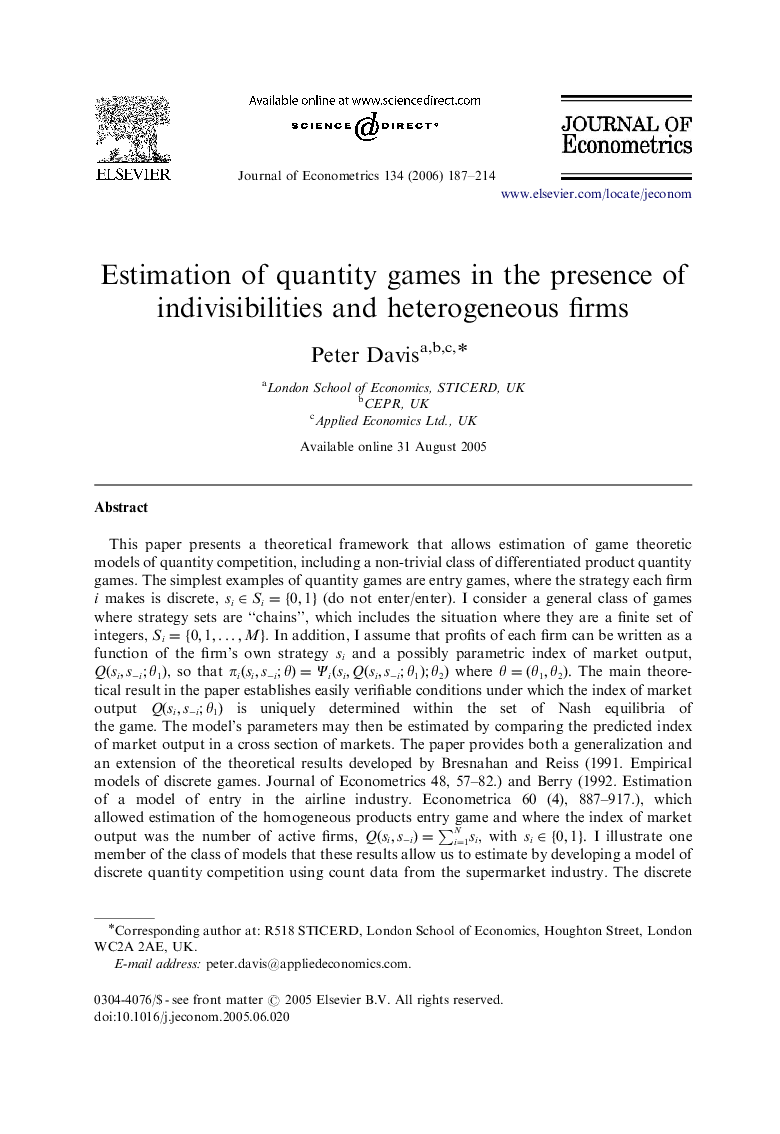| کد مقاله | کد نشریه | سال انتشار | مقاله انگلیسی | نسخه تمام متن |
|---|---|---|---|---|
| 5097509 | 1376593 | 2006 | 28 صفحه PDF | دانلود رایگان |
عنوان انگلیسی مقاله ISI
Estimation of quantity games in the presence of indivisibilities and heterogeneous firms
دانلود مقاله + سفارش ترجمه
دانلود مقاله ISI انگلیسی
رایگان برای ایرانیان
کلمات کلیدی
موضوعات مرتبط
مهندسی و علوم پایه
ریاضیات
آمار و احتمال
پیش نمایش صفحه اول مقاله

چکیده انگلیسی
This paper presents a theoretical framework that allows estimation of game theoretic models of quantity competition, including a non-trivial class of differentiated product quantity games. The simplest examples of quantity games are entry games, where the strategy each firm i makes is discrete, siâSi={0,1} (do not enter/enter). I consider a general class of games where strategy sets are “chains”, which includes the situation where they are a finite set of integers, Si={0,1,â¦,M}. In addition, I assume that profits of each firm can be written as a function of the firm's own strategy si and a possibly parametric index of market output, Q(si,s-i;θ1), so that Ïi(si,s-i;θ)=Ψi(si,Q(si,s-i;θ1);θ2) where θ=(θ1,θ2). The main theoretical result in the paper establishes easily verifiable conditions under which the index of market output Q(si,s-i;θ1) is uniquely determined within the set of Nash equilibria of the game. The model's parameters may then be estimated by comparing the predicted index of market output in a cross section of markets. The paper provides both a generalization and an extension of the theoretical results developed by Bresnahan and Reiss (1991. Empirical models of discrete games. Journal of Econometrics 48, 57-82.) and Berry (1992. Estimation of a model of entry in the airline industry. Econometrica 60 (4), 887-917.), which allowed estimation of the homogeneous products entry game and where the index of market output was the number of active firms, Q(si,s-i)=âi=1Nsi, with siâ{0,1}. I illustrate one member of the class of models that these results allow us to estimate by developing a model of discrete quantity competition using count data from the supermarket industry. The discrete quantity game is the game theoretic analogue to ordered LDV models such as the ordered probit model.
ناشر
Database: Elsevier - ScienceDirect (ساینس دایرکت)
Journal: Journal of Econometrics - Volume 134, Issue 1, September 2006, Pages 187-214
Journal: Journal of Econometrics - Volume 134, Issue 1, September 2006, Pages 187-214
نویسندگان
Peter Davis,